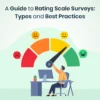In the healthcare industry, feedback is essential to improve medical practices. To gather medical data, there is no better way than online medical surveys. These surveys are conducted by healthcare organizations, medical research institutions, NGOs, and even individuals who are interested in healthcare.
There are tons of benefits of medical surveys—collecting patient feedback, finding areas of improvement, monitoring the performance of medical professionals, making practical decisions based on the gathered data, and more. In this blog, we will discuss different types of medical surveys and give a few tips.
Different Types of Online Medical Surveys
In general, many people often associate medical surveys with patient feedback. However, online medical surveys are not only about patient feedback, but also about taking feedback on clinical trials, latest medical treatments, medical research and more. Listed below are some of the common medical surveys:
Online Medical Surveys for Doctors
Firstly, we have medical surveys for doctors where they need to fill in surveys about their experience with different types of patients, the types of medications they prescribe, and many more. They can even suggest areas for improvements, their opinions about new treatments or medications and whether there should be any changes in hospital protocols, etc. This feedback is used by the survey organizers to make improvements in the respective areas.
Online Medical Surveys for Physicians
Physicians are healthcare specialists who have residency training and completed medical education, such as surgeons, dentists, general practitioners, and many more. They have vast book knowledge on healthcare subjects and also hands-on practical medical experience.
In general, physicians fill out surveys about issues in the healthcare industry, give their opinions on clinical trials and protocols, and more.
Medical surveys for physicians often contain in-depth questions about a certain speciality. For example, dentist surveys are filled with questions related to dentistry, while for a neurosurgeon, questions related to neurosurgery are included in the surveys.
Sometimes, physicians fill out surveys about the medical equipment and medications used for surgeries, and this feedback is used by pharmaceutical and equipment manufacturing companies to enhance their products.
Online Medical Surveys for Nurses
Nurses are an integral part of the healthcare system; they work 24/7 and take the best care of patients. From injecting IVs, giving medication, talking with patients to reporting health status to doctors, their responsibilities in healthcare are diverse. Because they play a vital role in the medical field, nurses are often paid well for taking surveys.
Coming to the type of surveys taken by nurses, it varies. For example, nurses know more in detail about medical tools like syringes, trays, band aids, etc., which is why their opinions are considered to know about the quality of these tools and whether they are sterile or not.
Since nurses often console patients and provide top-notch care, they help survey organizers understand the best patient care practices. Also, there are online medical surveys for nurses on the healthcare work environment and the maintenance of the hospitals and clinics.
Patient Online Medical Surveys
Here comes the most common medical surveys—patient surveys. Hospitals and clinics thrive because patients trust them to provide the best care, which is why patient surveys are given utmost importance.
The Press Ganey report reveals that clinics and hospitals that gather and work on patient feedback experienced 10% higher patient satisfaction than usual.
There are different types of patient surveys that focus on various aspects—symptoms, doctor and nurse care, treatment efficiency, and overall satisfaction.
Most of the patient online surveys are about common symptoms experienced by the patients, severity of the symptoms, how long it took to diagnose their condition, did they follow any home remedies, and more. There are also surveys that are solely focused on the type of medication taken, treatment used, effectiveness of the treatment, opinion about doctor care, any side effects, etc.
Medical Research Surveys
Medical research, as the name implies, is the research on various aspects of the medical field. However, research is conducted mostly on the development of new medications and treatments and improving the existing ones. These surveys are often answered by medical researchers, scientists, pharmaceutical companies, and research institutions.
In medical research surveys, data is gathered about diseases, potential risks, and prevalence with a focus on certain parameters like age, gender, nationality, etc. For example, surveys conducted on the percentage of people affected by COVID-19 come under medical research surveys. In addition, in some research surveys, data is gathered about the lifestyle choices of the people, their symptoms, and their medical conditions to plan effective treatment plans.
Healthcare Market Research Surveys
And then we have healthcare market research surveys, that are about market research of the healthcare industry. For example, many companies and independent organizations conduct surveys about the market size of the healthcare industry globally or in specific countries. One such example is the survey conducted by India Brand Equity Foundation (IBEF) where it was revealed that the market size of private and public healthcare sectors in India surpassed USD 372 billion in 2023.
Medical market research surveys also obtain information about the total number of active physicians, competitors, healthcare providers, and many more. A great example of such survey is done by Statista, and it was reported that the number of hospitals in the USA as of 2022 was 6,120 compared to a total of 7,156 hospitals in 1975.
How to Conduct Effective Medical Surveys: 10 Best Tips
To get accurate, informative, and on point responses, it is essential to conduct effective medical surveys. We have come up with a few smart tips:
- Determine the objectives: The first thing you should do is determine the objectives of the survey. Do you want to gather feedback on patient care or effectiveness of a certain treatment? By specifying the objectives, it will be easy for you to develop a proper questionnaire.
- Stick to simple, direct language: There is no need to use complex jargon unless it is required. Ask questions in a simple, direct language so people can understand the questions better.
- Keep it anonymous: Let the people know that the survey is anonymous because they are likely to give unbiased responses when anonymity is ensured.
- Avoid lengthy survey questionnaires: It is better to keep the survey short and simple. Making it lengthy will make people lose interest quickly, leading to the abandonment of the survey.
- Offer the survey in different languages: If you want to collect feedback from a large group of people, you should offer the survey in multiple languages.
- Review and pilot test the survey: Medical surveys can contain sensitive data, which is why you should make sure there are no errors. For this, it is recommended to pilot test the survey before launching it to the public.
- Send reminder emails: If people have started the survey and haven’t finished it, you can send follow-up reminder mails. But make sure not to spam their inbox with reminder mails.
- Consider using multiple channels: In order to reach more people, you should consider using multiple channels, such as SMS, emails, and even social media channels. The more channels, the more people you are likely to reach and gather broad feedback.
- Give incentives: Filling surveys for free does not sound interesting, right? That is why you should offer incentives for completing the surveys, such as first-aid sets, cash gifts, gift cards, free consultation, and more.
In a Nutshell
Medical surveys can help businesses and individuals gather critical data on various aspects of healthcare. This data can be used to understand patients’ satisfaction, improve treatments and medications, gather insights on the medical industry, and more.
Do you want to conduct a sample medical survey and see how it works? Visit piHappiness and check out the available templates—the best part is they are free.
If you need further assistance, contact our team, we are always happy here to help.







